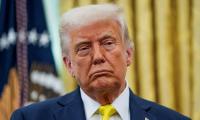ISLAMABAD: The caretaker government’s report on May 9 said that it was an organised and dangerous strategy not only to pressurise the Pakistan Army for a political deal to meet Imran Khan’s demands but a brazen attempt to incite rebellion from within the armed forces in PTI’s favour.
“The party had been emboldened by a lack of firm response to its earlier violence by state institutions. A frontal assault on military installations was to weaken the army’s morale and pressure it into political deal making. This was also a brazen and a mistaken attempt at inciting rebellion from within the armed forces in its favour,” says the report. It added, “The events of May 9, 2023 were neither isolated nor entirely spontaneous. They were part of an organised and dangerous strategy to pressure state institutions into acceding to Mr Khan’s demands.”
The report said that the events of May 9, 2023 were the culmination of a narrative built around a personality cult, and a strategy that justified violence against his opponents as national service.
The caretaker government’s cabinet committee, which probed the matter, noted with “profound pain” that a popular political party would elect to hurt national interest through such reckless plans. The Constitution guarantees the right of political association to advance the interests of the people, not to harm state institutions and national interests.
According to the report, “Mr Khan had long seen the military establishment as, both, the entity responsible for his ouster from the government and the only institution he was open to negotiating with. Mr Khan had repeatedly voiced his contempt for other political parties and their leaders and his constant refusal to even sit in Parliament with them. He had also expressed a desire to engage with the military establishment to find political solutions. Mr Khan refused to respect the constitutional role for the armed forces that require them to remain apolitical. He desired active engagement by the armed forces in politics in violation of their constitutional mandate. When the armed forces refused to be dragged into politics, Mr Khan and his party sought to create an environment that would pressure them into engaging with him. This was augmented by a media strategy through local and external platforms. Mr Khan at no point denounced or disowned the May 9 event, rather twisted its facts to widen the divide between the people and the armed forces, nor he has publicly acknowledged the consequences of this event on the national security of Pakistan.
The report said, “A strategy was developed to demonstrate street power by attacking defense installations. This would, at once, allow PTI supporters to vent their anger for the no-confidence motion at the armed forces, and to pressure them into engagement with PTI. This strategy was based on a simple assumption that a clash between unarmed protesters and the military would generate anti-military sentiment, thus creating a gulf between the people and the armed forces. Such a gulf would corner the military into engaging politically and, perhaps, Mr Khan saw himself as a savior capable of bridging such a gulf.”
JUIF chief briefed session on political as well as international affairs
Latif, whistleblower in Pakistan dressing room, said he has already started working on biography
Session was attended by regional and district officers of CCD from across province
Survey found that boost in economic optimism that accompanied Trump’s re-election has disappeared
Azam Khan Swati had accused KP Assembly speaker of making illegal appointments in provincial assembly
Shadab capped off his all-round performance with composed 47 off 40 balls, hitting five fours and two sixes







